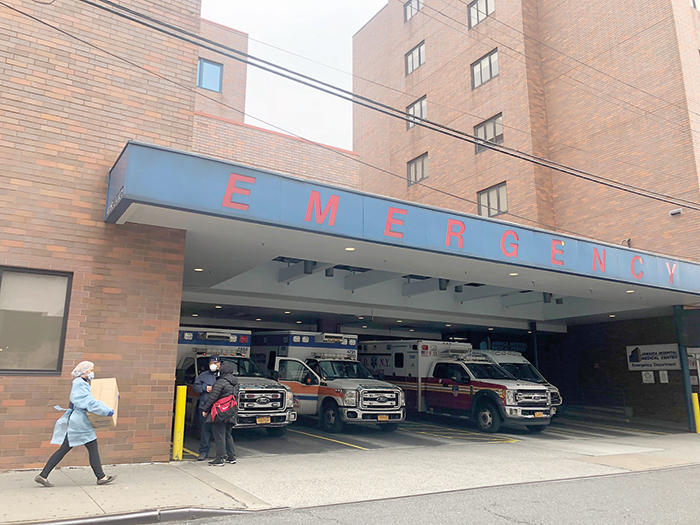Forum Photo by Michael V. Cusenza
Jamaica Hospital Medical Center
By Forum Staff
As surging COVID-19 cases threaten to overwhelm New York’s hospitals, U.S. Sen. Kirsten Gillibrand (D-N.Y.) is urging Congress to deliver increased funding for hospitals and health care providers in the next coronavirus relief package.
Specifically, Gillibrand said she is requesting the inclusion of these policy proposals in any upcoming COVID-19 relief package:
Funding for State and Local Governments to Avoid Spending Cuts: Any upcoming coronavirus relief legislation must include substantial funding for a state stabilization fund to provide direct funding to state and local governments, Gillibrand noted. In addition, it should increase the Families First Coronavirus Response Act’s temporary 6.2 percent increase in the Federal medical matching percentages (FMAP) to at least 14 percent. The increase should apply to costs associated with all Medicaid populations (including Affordable Care Act expansion populations), be retroactive to January 1, 2020, and last at least through September 30, 2021. The legislation should also provide flexibility to reform Medicaid programs without cutting any current beneficiaries off the rolls or increasing the ranks of the uninsured. In addition, the legislation should increase the state disproportionate share hospital (DSH) allotments to adjust for the increased FMAP. Without such an adjustment, states electing the enhanced FMAP would need to reduce aggregate hospital DSH payments to stay within their DSH allotments, inadvertently requiring cuts to hospitals.
Convert Medicare Advances to Grants: Relief legislation has enabled hospitals to request six-month Medicare advances (all other providers and suppliers can request a three-month advance) that were subject to certain repayment terms. Any coronavirus relief legislation should convert the Medicare advances into a grant/loan forgiveness program so that either no repayment or a partial repayment would occur, at a minimum we urge you to further delay the repayment of these loans.
Provider Relief Fund Increase and Flexibility for Emergency Expenses Related To COVID-19: Relief legislation should increase funding for the “Public Health and Social Services Emergency Fund” from $175 billion to at least $275 billion and ensure that hospitals and health systems receive immediate Federal funding—giving priority to hospitals in areas that have treated or continue to treat a disproportionate number of COVID-19 patients.
Crisis Pay and Bolstering the Health Workforce: Relief legislation should include “crisis pay” payments that could be used to fund increased wages, bonuses, and/ or benefits for health care workers.
Delay Upcoming Hospital Reimbursement Cuts and Modify Financing Terms: Relief legislation should eliminate the Medicaid Disproportionate Share (DSH) cuts, which are set to go into effect on December 11, 2020 as well as suspend the Medicare sequester cuts for at least the duration of the pandemic. The CARES Act suspended the 2 percent sequester cuts to Medicare providers, including hospitals, physicians, and post-acute care providers, but only through December 31, 2020. Relief legislation should also consider waiving or modifying payment terms to help them preserve cash flow and sustain operations. By requiring lenders to provide relief from debt covenants on hospital loans to prevent the triggering of financial penalties.
Infrastructure and Telehealth Funding for Hospitals: Relief legislation should increase capital access for hospitals that need infrastructure improvements, particularly those that used capital reserves to treat COVID-19 patient. Any relief package should improve the nation’s tele-health infrastructure by helping to fund provider startup costs such as purchasing videoconferencing equipment and reliable connectivity, and improving rules and regulations particularly around geographic, service type, provider restrictions, and accessibility for people with disabilities.

